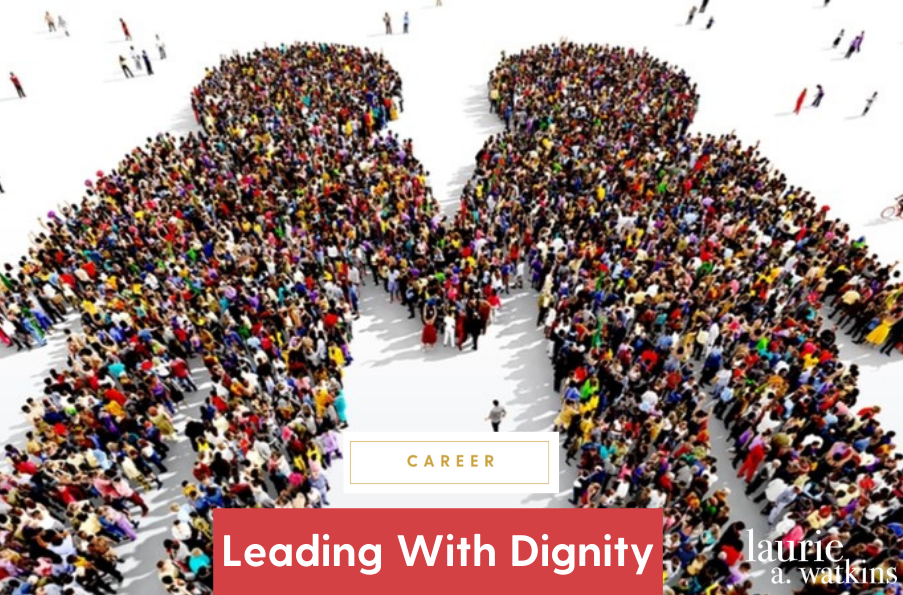People want to be treated well, and when they are, it brings out the best in them.
Given all the recent news stories of people having their dignity violated, there has never been a more important time for dignity to be recognized. It can be key to understanding organizations, communities, even personal and professional relationships.
Dignity MUST be a given. Respect is earned. Respect relates more to behavior while dignity teaches civility and humanity.
We should use dignity as our anchor and what grounds our work in the belief that everyone deserves to be treated as though they are valuable. Focusing on dignity can also help us deal with abusive or bullying bosses. We do not need to respect everyone; but, we do need to treat everyone with dignity.
Leaders, both professionally and personally, play a role in creating an environment that honors the dignity of others. When everyone feels that their dignity is honored, it creates a more tranquil and happy space for everyone to enjoy. Professional, spiritual, political, personal, racial, gender-based… no matter what the area is, there are ways to treat others with dignity.
When leaders fail to respect the dignity of others, it can lead to an environment of distrust and conflict. Honoring the dignity of others can strengthen relationships and lead to a feeling of safety as well as feeling seen, heard, and valued.
Dignity is not a traditional buzzword in the business world, or even in conversations about relationships. I remember hearing a few years back about a group of people that were interns at various large name investment firms in New York. While paying astronomical rent prices in Manhattan, these interns were being wildly overworked and underpaid. Many even began leaving a pillow and sleeping bag at the office, never getting to enjoy the expensive homes they were paying to “live in.” No matter how much they worked, they were always encouraged to work more.
This type of work culture does not respect the dignity of hardworking individuals. It does not create an environment that brings out the best in people. No one can be their best or perform their best professionally when they are overworked, exhausted, and undervalued.
If you are leader, some ways to help foster a culture where people are able to maintain their dignity include:
- Allow people to have a conversation about mistakes or a feedback review without it becoming emotional. Becoming emotional can often take away someone’s feeling of dignity. Allowing a safe space for constructive criticism is imperative.
- Break implicit bias patterns. Increase contact with people who are different from you. Although incidents of racial bias grab headlines, we can also form unconscious biases based on gender, gender identity, age, sexual orientation, marital status, education, and many other characteristics. We also tend to socialize most with people like us. Break that pattern by interacting with people outside your in-group. That interaction will have much greater effect if you work to form genuine friendships with those people, rather than rely on casual or infrequent contact.
- Listen to what others have to say, and take it into consideration. Nothing is more offensive than having someone tell you that they will work on something and then have no follow up. Really hear people out and respect what they are saying. Truly consider their points to allow them to feel dignified in coming to you.
- Minimize gossip. It can totally strip someone of their dignity if other people know things that they just aren’t supposed to know. Have enough compassion and respect for people’s dignity to keep things between you two until they’re ready for it to be more widely well-known.
- Recognize even the small contributions and wins, making all work and people feel valuable. If someone has to do a task they hate at work, or do something for you personally that they may feel is not enjoyable, recognizing how that contribution helps the bigger picture can allow someone to feel more dignified about their contributions.
- Think about as many people as you can before implementing any changes. Considering the impact on ALL people can make everyone feel dignified. If you only think about those on your level personally or financially, you could be offending or majorly inconveniencing others, affecting their dignity.
- Set people up for strength. Give people work that aligns with their skills and values.
- Treat all people equally. Giving special or extra attention to someone who earns more money or is at a higher employee level won’t make others feel valued and dignified.
- Support people even when they leave your leadership. Be willing to write letters of recommendation or help someone find a job that is best for their skillset with the goal of elevating that individual for success.
Having a general sense of empathy can really be a key part of leading with dignity. It can also just start with ourselves. Be sure that what you are doing excites you. Spend your time doing what you believe in. Take care of yourself. If you are a good version of yourself and make your own dignity a priority, it will help you see how important it is to recognize the value and dignity of others.
Donna Hicks’s Dignity Model describes ten essential elements of dignity and provides a framework for understanding how attention to dignity can help to strengthen relationships, resolve conflicts, and make organizations more successful. The Dignity Model provides a framework for understanding how the experience of dignity can help strengthen relationships, resolve conflicts, or make organizations more successful, and how violations of dignity inevitably damage relationships, incite conflicts, or undermine organizational cultures.
As Hicks writes in Leading with Dignity, “The emotional volatility associated with having our dignity honored or violated cannot be overstated. When people feel that their value and worth are recognized in relationships, they experience a sense of well-being that enables them to grow and flourish. If, in contrast, their dignity is routinely injured, relationships are experienced as a source of pain and suffering…. Why is this knowledge important for leadership? If we are going to lead people, we better understand them.”
I would love to hear from you! Did you learn that dignity and respect are different things? When was the last time you were treated with dignity? When was a time that you weren’t? How did those situations make you feel? Please share a comment here on the blog.






